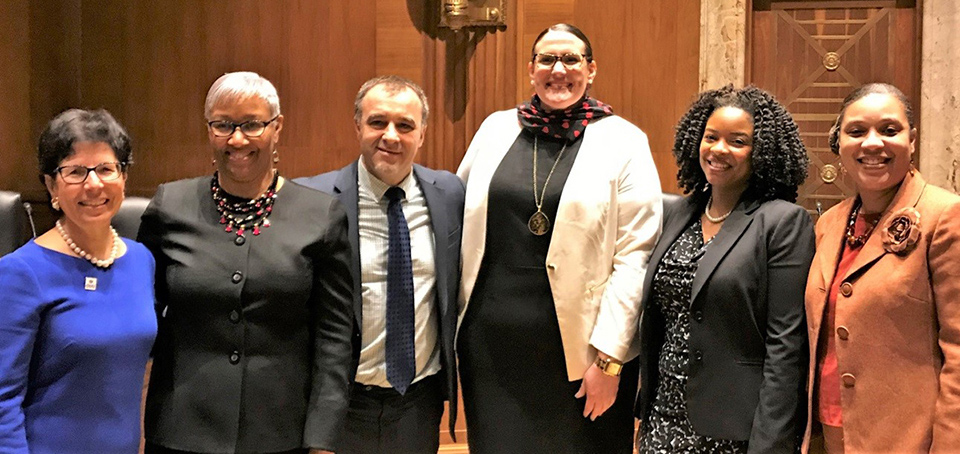08 Mar2018
By Zachary VanHouten

As we await a spring thaw, things are heating up in Washington as Congress continues tackling a crowded agenda. With a March 23 deadline to pass an omnibus funding the government for the remainder of Fiscal Year 2018, advocacy abounds to fund educator preparation programs. In addition, the process for Fiscal Year 2019 kicked off with the president releasing his budget request to Congress on February 12, launching Congress into its appropriations process.
With Higher Education Act (HEA) reauthorization moving in the House and a bill rapidly approaching in the Senate, what might the final bill look like? Will it be bipartisan? Will the process continue or devolve as the election year unfolds? Aside from HEA, will you pay more for Internet access, or will the joint resolution to address the rules change move forward under the Congressional Review Act? Join AACTE’s Deborah Koolbeck to learn about these and other important topics by signing up for the March Federal Update webinar – an exclusive AACTE member benefit.
21 Feb2018
By Zachary VanHouten
Congressional briefing panelists (L–R) Jane Bray, Jennifer Robinson, Mario Santos, Lisa Fischman, Danielle Riley, and Qualyn McIntyre. Photo courtesy of Megan Shearin, Old Dominion University.
A well-attended congressional briefing February 14 highlighted the positive impact of Teacher Quality Partnership (TQP) grants in schools around the country, aiming to inspire lawmakers and staff to continue supporting the program as they reauthorize the Higher Education Act (HEA) and determine appropriations for federal spending.
In a packed Senate hearing room, the Valentine’s Day briefing presented testimony about how TQP grants have catalyzed improvements to educator preparation programs as well as to the schools and communities they serve. Dean Jane Bray of Old Dominion University (VA) served as moderator for the panel discussion.
16 Feb2018
By Deborah Koolbeck
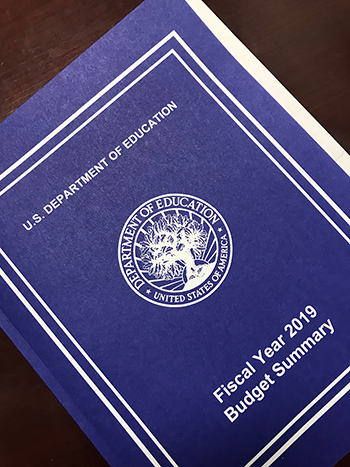
On February 12, President Trump released his Fiscal Year 2019 (FY19) budget request to fund the federal government. Similar to the previous request, this plan cuts 29 education programs while carving out space and funds for new programs focusing on choice opportunities.
In a press release from the U.S. Department of Education, Secretary Betsy DeVos lauded the request for “expanding education freedom for America’s families while protecting vulnerable students.”
According to the Department’s fact sheet, the president’s education budget features six major themes:
- Providing better choices for more families to attend a high-quality school.
- Supporting high-quality special education services to children with disabilities.
- Creating new and alternative pathways to successful careers for students.
- Promoting innovation and reform around STEM education.
- Implementing school-based opioid abuse prevention strategies.
- Making the Department more efficient while limiting the Federal role in education.
16 Feb2018
By Deborah Koolbeck
Despite all the action in Washington, DC, this month, AACTE will not be offering a February Federal Update webinar – instead, please catch it live at the AACTE 70th Annual Meeting in Baltimore.
In fact, I am thrilled that this year you have two opportunities to catch my Washington Update: Thursday, March 1, 3:45–4:45 p.m., and Saturday, March 3, 10:30-11:30 a.m.
25 Jan2018
By Zachary VanHouten
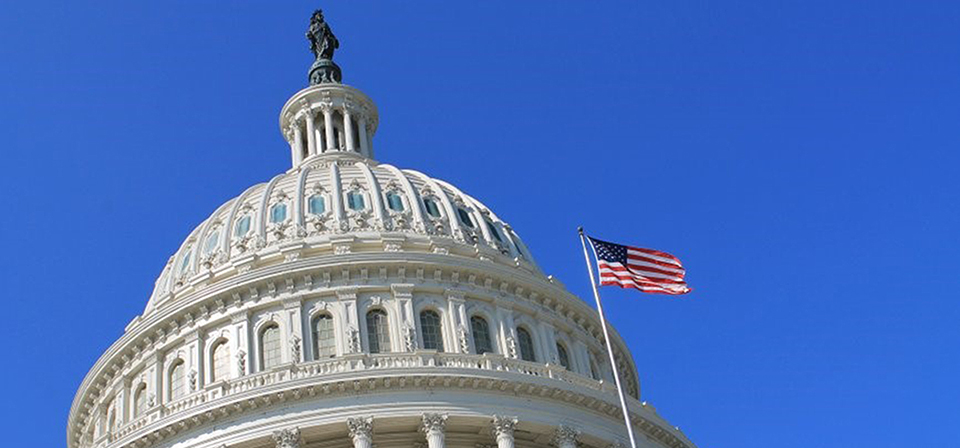
Did you miss the January AACTE Federal Update webinar? The recording and slides are now available in AACTE’s Resource Library – a free, member-exclusive benefit! Catch up on all the latest developments in Washington, DC, as Congress works through a packed and polarizing agenda this month. Feel free to share these resources with colleagues at your institution who might also be interested in viewing.
Remember, there will be no February Federal Update webinar (we will resume again in March!), as you’ll have the opportunity to attend two Washington Update sessions in early March at AACTE’s 70th Annual Meeting in Baltimore, Maryland. You’ll also want to attend Deborah Koolbeck’s “advocacy speed-dating” session March 2, where you can participate in your choice of five mini advocacy trainings:
19 Jan2018
By Zachary VanHouten

The clock is ticking on what appears to be an imminent federal government shutdown, unless a last-minute deal is struck on a short-term funding solution (continuing resolution) through either next week or February 16. Republicans and Democrats are facing off on numerous issues.
What’s causing this logjam? Challenges range from settling on a legislative fix for the Deferred Action for Childhood Arrivals program to reauthorizing the Children’s Health Insurance Program, increasing defense spending, deferring some healthcare tax provisions, extending the Supplemental Nutrition Assistance Program, and raising spending caps (aka “a budget deal”). What’s also coming in February is the need to raise the debt ceiling. Looking forward, we could see more action on the reauthorization of the Higher Education Act through the spring.
16 Jan2018
By Deborah Koolbeck

As you plan your session schedule for the AACTE Annual Meeting, don’t neglect your advocacy skill development! Please join me Friday, March 2, at 2:00 p.m. for “Putting Advocacy to Work.”
In this speed-dating-style session, I will run the clock while you circulate through your choice of introductory mini-sessions led by experts and professionals. There will be four time slots during this hour-long opportunity, each beginning with a few minutes of commentary by the leaders, and then opening for questions and discussion. Move from table to table to learn how to start off:
19 Dec2017
By Zachary VanHouten

Did you miss last week’s Federal Update webinar? AACTE members can log in now to view the recording here.
An overcrowded agenda is staring down members of Congress as they prepare to leave for the winter recess. Items such as DACA (Deferred Action for Childhood Arrivals), tax reform, a budget deal, disaster relief, and CHIP (the Children’s Health Insurance Program) are items requiring policy makers’ attention before they leave Washington. In the midst of this activity, Chairwoman Virginia Foxx (R-NC) of the U.S. House Committee on Education and the Workforce introduced the “Promoting Real Opportunity, Success, and Prosperity through Education Reform (PROSPER) Act,” which is the House Republican bill that would reauthorize the Higher Education Act.
19 Dec2017
By Deborah Koolbeck
On Friday, December 15, members of the U.S. Congress unveiled a conference report on tax reform, resolving differences between the House and Senate bills.
Full text of the conference report, which is nearly 1,100 pages long, can be found here. For those who want to go into the weeds, a joint explanatory statement, which describes current law, the House and Senate provisions, and what is in the conference agreement, can be found here.
05 Dec2017
By Sarah Verneret
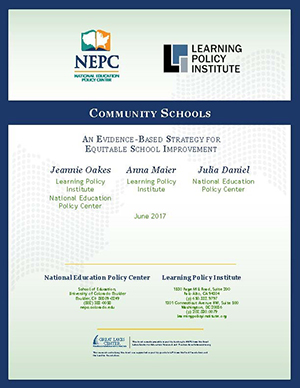
On November 14, the Learning Policy Institute (LPI) held a briefing to share research-based findings and recommendations on investing in community schools as a means to school improvement. The briefing was based on a study LPI recently conducted with the National Education Policy Center and highlighted community schools – that is, schools that partner with local agencies to provide integrated academic, health, and social services to the community – as a school improvement approach that meets the Every Student Succeeds Act (ESSA) requirement for “evidence-based” interventions.
At the briefing, panelists included representatives from community schools and other supporters. Community School Director Shanelle England described her work at Baltimore’s Forest Park High School, which consists of supporting her students, their families, and the school staff, as well as developing relationships with community agencies. The panelists all advocated for continued funding for the integrated models.
01 Dec2017
By Deborah Koolbeck
On the same day that Chairwoman Virginia Foxx (R-NC) released her Higher Education Act (HEA) reauthorization bill in the U.S. House of Representatives, the Trump Administration released a set of principles for HEA reauthorization.
The White House document (see PDF here) reveals five broad goals and eight policy principles for consideration as the reauthorization process begins in the U.S. House of Representatives. The House Education and the Workforce committee is expected to move the bill forward starting the week of December 4. On the U.S. Senate side, Chairman Lamar Alexander (R-TN) has stated that HEA reauthorization will be a priority for the Health, Education, Labor, and Pensions committee next year.
01 Dec2017
By Deborah Koolbeck
On December 1, the Republicans of the U.S. House of Representatives Committee on Education and the Workforce released their bill to reauthorize the Higher Education Act. H.R. 4508, the “Promoting Real Opportunity, Success, and Prosperity though Education Reform (PROSPER) Act,” would change or repeal aspects of the current law.
While we are still analyzing the bill, here are few key provisions that would affect educator preparation:
01 Dec2017
By Jemima Cabedo
Faculty from three AACTE-member universities were featured guests in an Education Talk Radio show last month to discuss their experiences as Teacher Quality Partnership (TQP) grantees. Joining host Larry Jacobs were the following teacher educators:



- Christina K. O’Connor, Director, Professional Educator Preparation, Policy, and Accountability, and Co-Chair, Collaborative for Educator Preparation, University of North Carolina at Greensboro; Regional Director, North Carolina New Teacher Support Program
- DaShaunda Patterson, Clinical Assistant Professor, Educational Psychology, Special Education, and Communication Disorders, Georgia State University
- Jennifer Robinson, Director of the Center of Pedagogy, Montclair State University (NJ)
09 Nov2017
By Deborah Koolbeck
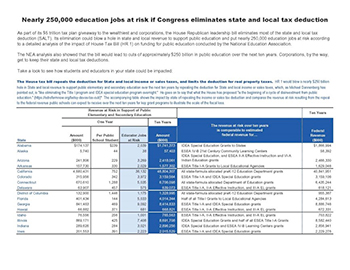
Today the National Education Association (NEA) released an analysis of the U.S. House tax reform bill, H.R. 1, the “Tax Cuts and Jobs Act,” to project the impact on PK-12 education of the elimination of the State and Local Tax (SALT) deduction for individuals (the tax plan permits corporations to keep this deduction).
In a press release, the NEA highlighted the potential effect of this single elimination: “The impact of eliminating SALT on public education is nearly equal to the education jobs lost during the Great Recession. By most accounts, the country lost about 300,000 education jobs during that time.”
09 Nov2017
By Zachary VanHouten
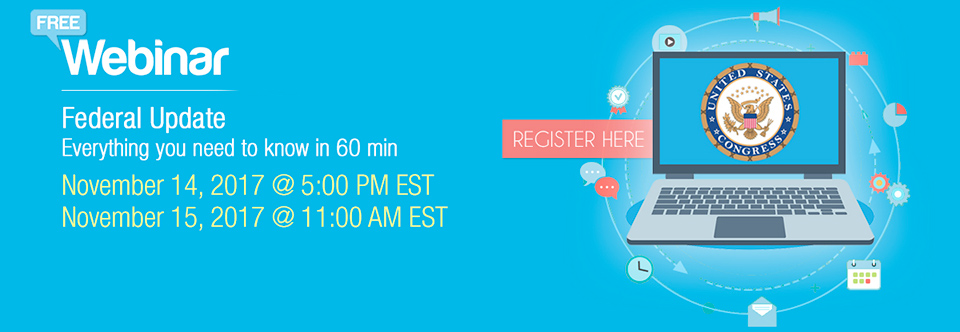
As the tax reform debate wages on in Congress, and as many other items linger on the agenda, there is much to accomplish in Washington by the year’s end. Many of the items will have an impact on the education community. Let AACTE help unpack and process some of the latest developments for you by joining our free, members-only November and December Federal Update webinars.
To accommodate busy end-of-year schedules and various time zones, AACTE offers each webinar at two different dates and times. Click on your preferred date/time below to register.








